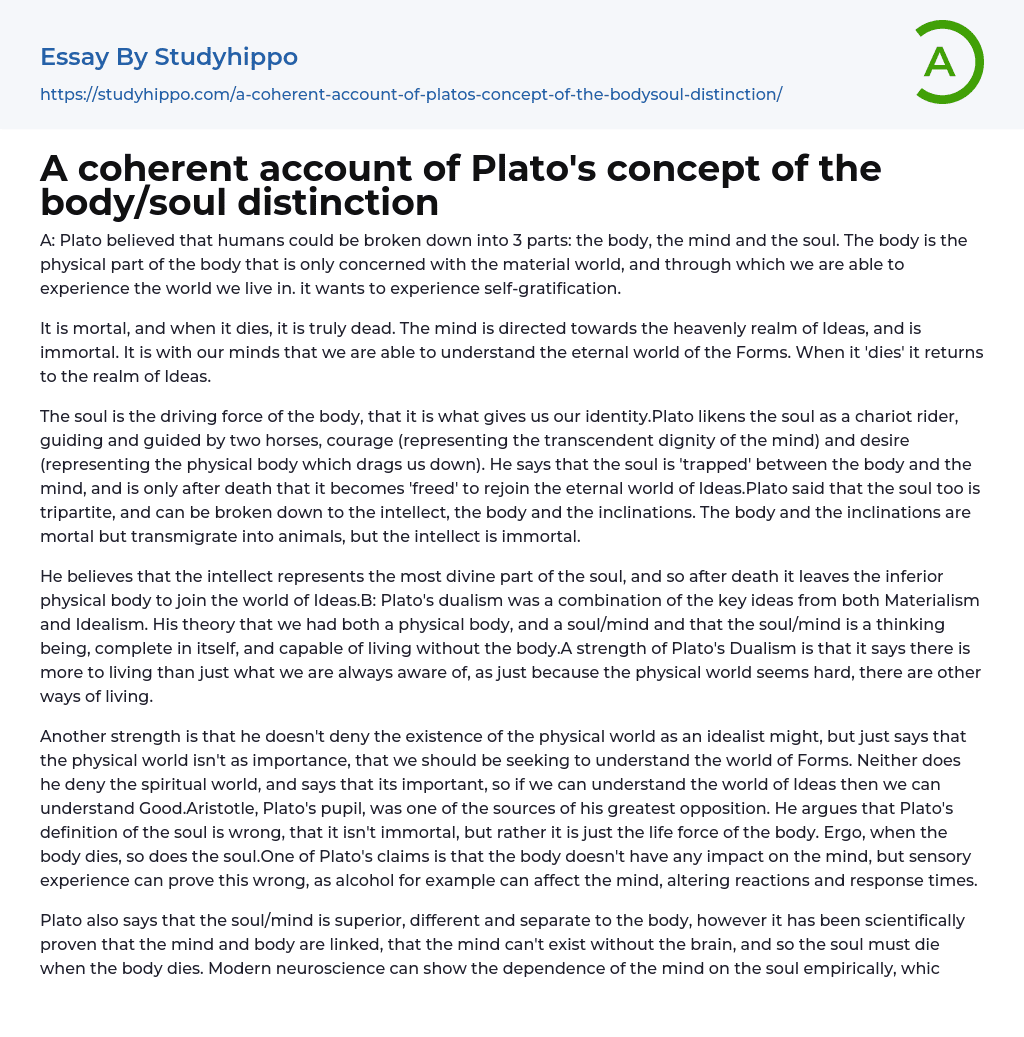

A coherent account of Plato’s concept of the body/soul distinction Essay Example
Plato categorizes humans into three parts: the body, mind, and soul. The body is responsible for our physical experiences and desires.
While the mortal body dies and remains deceased, the immortal mind is focused on the spiritual world of Ideas. Through our minds, we gain insight into the timeless world of Forms; when the mind 'dies', it crosses over into the realm of Ideas once again.
According to Plato, the soul is what drives and identifies the body. He compares it to a chariot rider, guided by courage (representing the mind's transcendent dignity) and desire (representing the physical body that pulls us down). Plato describes the soul as being 'trapped' between the body and mind while alive, but once freed after death, it rejoins the eternal world of Ideas. Plato believes that the soul is composed of three parts: intellect, body, and inclinations. The body and inc
...linations are mortal and transmigrate into animals, but the intellect is immortal.
According to Plato, the intellect is the divine aspect of the soul. This element separates from the inferior physical body after death and rises to the realm of Ideas. His Dualism combines Materialism and Idealism concepts, affirming that humans have both a physical body and a mind/soul capable of independent thought and existence beyond it. One benefit of Plato's Dualism is its acknowledgment that life encompasses more than what our senses can immediately perceive, demonstrating that alternative forms of existence are feasible.
Plato recognizes the existence of the physical world, unlike an idealist. However, he believes that comprehending the world of Forms is more important. He acknowledges the importance of the spiritual realm and claims that understanding Good comes from understanding
the world of Ideas. Aristotle, Plato's student, challenges him by disagreeing with his definition of soul. Aristotle emphasizes that the soul is not immortal but rather just a life force for the body; therefore, it dies with it. Plato argues that sensory experience proves otherwise as alcohol affects responses and reaction times despite having no impact on the mind-body connection.
Plato believed that the soul/mind was distinct from and unequal to the body, but modern understanding shows a connection between them. Scientific evidence demonstrates that the mind requires the brain for existence, meaning that Plato's idea of an immortal soul is not valid. Modern neuroscience can prove that the body affects the mind, unlike Plato's notion of an unverifiable pure immortal soul. Plato held that a non-physical mind could not control the body; however, football players obey their minds when chasing after a ball without reason. Nevertheless, even though it receives no electrical signals, the body can function briefly after death.
- Unconscious Mind essays
- Bias essays
- Big Five Personality Traits essays
- Body Image essays
- Mind essays
- Motivation essays
- Phobias essays
- Thought essays
- Albert Camus essays
- Aristotle essays
- Carl Jung essays
- Henry David Thoreau essays
- Immanuel Kant essays
- John Dewey essays
- Karl Marx essays
- Machiavelli essays
- Michel Foucault essays
- Plato essays
- Rene Descartes essays
- Rousseau essays
- Socrates essays
- Thomas Hobbes essays
- Afterlife essays
- Atheism essays
- Bible essays
- Buddhism essays
- Christian Worldview essays
- Christianity essays
- Confession essays
- Cosmological Argument essays
- Deism essays
- Devil essays
- Existence of God essays
- Faith essays
- Freedom Of Religion essays
- God essays
- Hinduism essays
- Immortality essays
- Islam essays
- Jainism essays
- Jews essays
- Judaism essays
- Miracle essays
- Monk essays
- Monotheism essays
- New Testament essays
- Old Testament essays
- Pilgrimage essays
- Puritans essays
- Revelation essays



